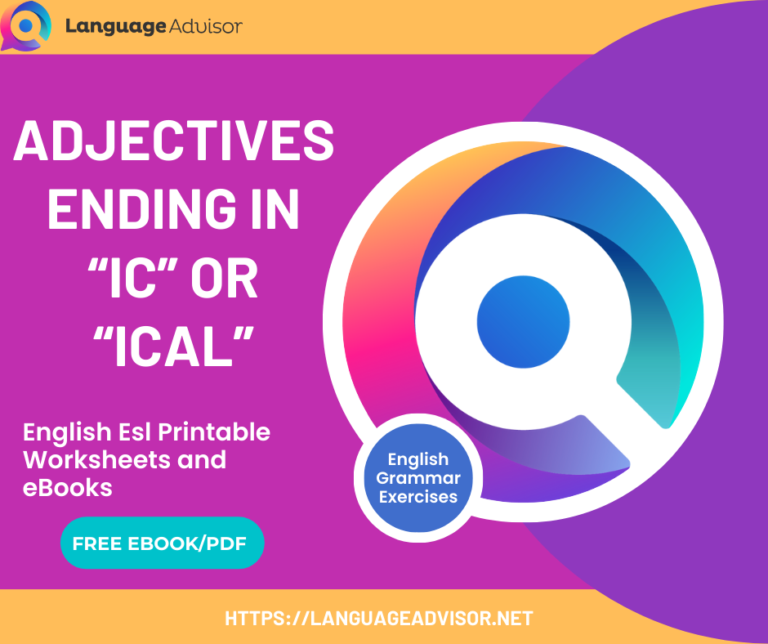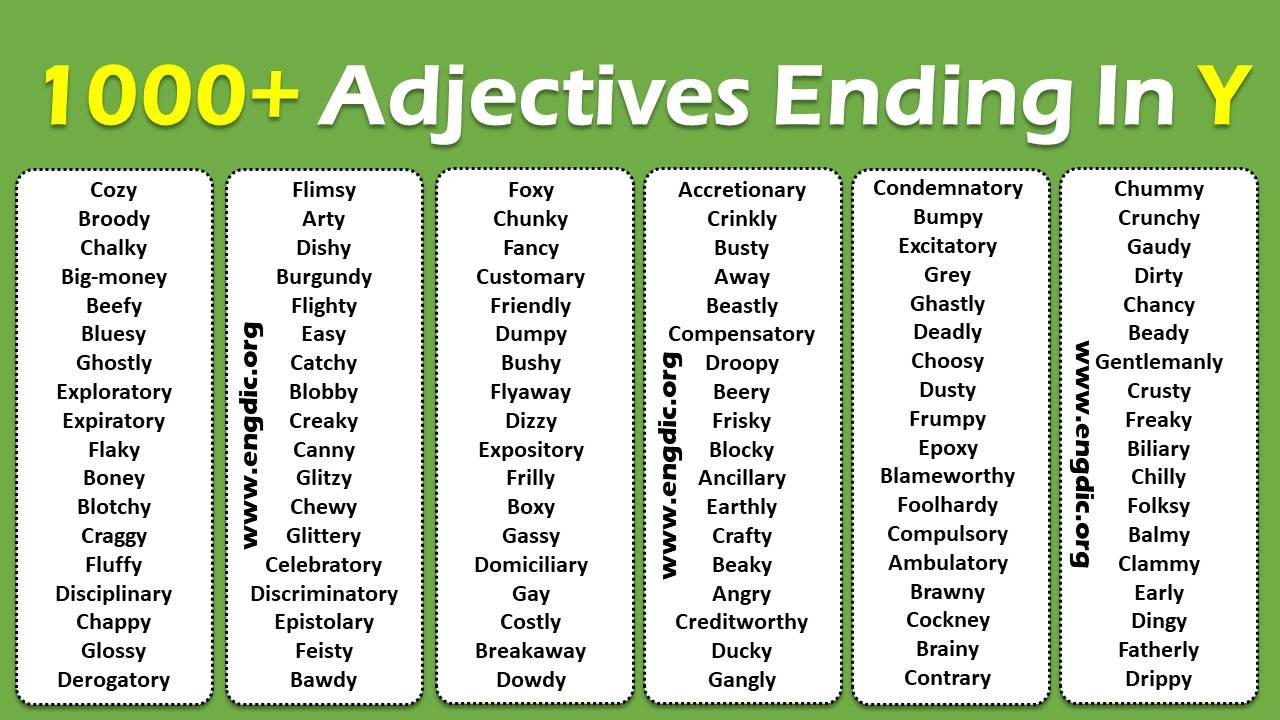Unlock English Brilliance: Master Adjectives Ending In "ic"
Could a single suffix truly transform your ability to communicate with precision and flair? The answer, surprisingly, is a resounding yes. Adjectives ending with "-ic" are linguistic powerhouses, enriching the English language and equipping writers and speakers with tools to paint vivid pictures with words.
This exploration delves into the fascinating world of adjectives ending in "-ic", unraveling their meanings, applications, and the subtle nuances they bring to expression. From academic treatises to literary masterpieces, these words shape our understanding and perception. This guide promises a comprehensive understanding of these descriptive words, equipping you with the knowledge to wield them effectively and elevate your communication skills. Whether you're a seasoned wordsmith or a language enthusiast, the journey into the realm of "-ic" adjectives is a voyage of discovery and linguistic enrichment.
Table of Contents
- What Are Adjectives Ending with "IC"?
- Common Examples of Adjectives Ending with "IC"
- How to Identify Adjectives Ending with "IC"
- Usage of Adjectives Ending with "IC"
- Adjectives Ending with "IC" in Literature
- Benefits of Learning Adjectives Ending with "IC"
- Tips for Mastering Adjectives Ending with "IC"
- Common Mistakes to Avoid
- Quiz to Test Your Knowledge
What Are Adjectives Ending with "IC"?
Adjectives ending in "-ic" are more than just a collection of letters; they are powerful modifiers that breathe life into language. Derived often from nouns or verbs, these words serve to describe, qualify, or characterize another word, typically a noun or pronoun. The "-ic" suffix acts as a transformative agent, lending a specific quality or attribute to the base word. Considering the root is the key to unlocking the meaning.
- Movierulzcom Is It Safe Risks Legality Alternatives
- Unveiling Zuri Kye Edwards From Atlanta To Global Star
Consider the word "economic." Rooted in "economy," it immediately conveys a connection to financial matters, production, and distribution of wealth. "Historic," stemming from "history," transports the reader to the realm of the past, invoking a sense of significance or event importance. Understanding this relationship provides a vital framework for expanding vocabulary. This makes adjectives ending with "ic" an invaluable asset for those seeking to express themselves with clarity, precision, and depth.
Data on Adjectives Ending with "-ic"
The following table provides a concise overview of the key features and properties of adjectives ending in "-ic".
| Feature | Description |
|---|---|
| Suffix | -ic |
| Word Derivation | Primarily from nouns and verbs |
| Function | To modify nouns and pronouns, providing characteristics and attributes |
| Meaning Conveyance | Often related to nature, origin, or resemblance of the root word |
| Usage Contexts | Academic writing, literature, journalism, everyday conversation |
| Examples | Economic, historic, fantastic, scientific, tragic, comic, mystic |
| Benefits | Enhanced vocabulary, improved writing skills, better comprehension |
| Common Mistakes | Confusing -ic with -ical, mispronunciation, overuse |
| Link for reference | Merriam-Webster Dictionary |
Common Examples of Adjectives Ending with "IC"
The versatility of adjectives ending in "-ic" is showcased through the breadth of their application. Here are some of the most prevalent, accompanied by their meanings, which exemplify their importance in shaping our communication:
- Spf Body Lotion Your Guide To Sun Protection Healthy Skin
- Pie Agrave La Mode Origins Meaning Why Its Beloved Discover Now
1. Economic
This adjective is a cornerstone when discussing financial systems, commerce, and the overall financial landscape. For instance, "The economic downturn significantly impacted global trade" highlights how this word helps dissect and convey complex financial issues.
2. Historic
Marking events of lasting significance, "historic" connects the present to the past. The sentence, "The signing of the Declaration of Independence was a historic moment for the United States" underscores the adjective's power to pinpoint and define periods of noteworthy importance.
3. Fantastic
The term opens a window into imagination and fantasy, often used to describe the extraordinary. When we say, "The children were enthralled by the fantastic creatures in the story," we use "fantastic" to evoke a sense of awe and wonder.
4. Scientific
This word highlights the link between research, inquiry and empirical knowledge. It is very common in academic texts. "The scientific method emphasizes structured testing", demonstrating its use in defining the core of science.
5. Tragic
"Tragic" is the word that captures the essence of sorrow, catastrophe, and suffering. It is frequently used to invoke empathy in creative writing. "The tragic end of the play left the audience deeply moved" illustrates its power in describing human experiences.
6. Comic
Opposite of "tragic," the word "comic" is one for humor and lightheartedness. It lightens moments of intensity and offers emotional balance. "The comic relief in the movie prevented the overall dark atmosphere", a perfect example.
7. Mystic
This adjective evokes the spiritual and the unexplained, adding an atmosphere of mystery to our thoughts. "The mystic rituals of the tribe intrigued the researchers", a perfect example.
How to Identify Adjectives Ending with "IC"
Spotting these adjectives is a fundamental skill. The easiest approach is by recognizing the "-ic" ending and then assessing how the word operates within a sentence. The following strategies can help streamline the process:
- Contextual Examination: Carefully review how the word interacts with other words in the sentence. Determine if it is describing or modifying a noun or pronoun.
- Root Connection: Identify the original noun or verb. Does the adjective stem from a readily identifiable base word?
- Dictionary Verification: Consult a dictionary. This confirms the word's function.
Usage of Adjectives Ending with "IC"
The applications of adjectives ending in "-ic" are varied, reflecting their widespread utility. They are used across a broad spectrum of communicative practices:
1. Academic Writing
These adjectives provide the language to discuss concepts and theories. For example, "The scientific study of climate change demands rigorous methodologies" highlights the precision that these words deliver in scholarly settings.
2. Literature
Here, they infuse descriptions with emotion and depth. Imagine, "The romantic evening glowed with a picturesque and atmospheric tone."
Adjectives Ending with "IC" in Literature
Literary history is filled with authors that use these adjectives to produce engaging images and emotional effects. Shakespeare, for instance, utilized words like "tragic" and "comic" to shape character and story context. In contemporary literature, authors use words like "fantastic" to emphasize the supernatural and create mystery. Such adjectives help add layers of meaning and enrich the reader's experience. A study published in the Journal of Linguistics also found that these adjectives are frequently used in English literature, underscoring their importance in the creative process.
Benefits of Learning Adjectives Ending with "IC"
Gaining a grasp of the "-ic" adjectives comes with multiple benefits:
- Enhanced Vocabulary: Increase the size and the precision of your vocabulary.
- Improved Writing Skills: Make your writing more vivid and compelling.
- Better Comprehension: Improve your capability to understand the subtleties of the English language.
Tips for Mastering Adjectives Ending with "IC"
Achieving mastery in this area requires a strategy of dedicated learning:
- Extensive Reading: Be exposed to the context by reading often.
- Flashcards: Use flashcards and apps to store and memorize new adjectives.
- Practice Writing: Make sentences applying these adjectives.
- Engage in Conversation: Use these newly learned words in practice.
Common Mistakes to Avoid
When using adjectives ending in "-ic," awareness of common pitfalls will help to refine your writing:
- Confusion: Avoid confusion between "-ic" and "-ical."
- Pronunciation: Speak each word correctly to confirm your clarity.
- Overuse: Practice restraint, avoiding the use of too many adjectives.
Quiz to Test Your Knowledge
Test your knowledge of adjectives ending with "ic":
- What does the adjective "historic" mean?
- Name three adjectives ending with "ic" that relate to science.
- Identify the adjective in the following sentence: "The magic wand was used in a fantastic performance."
- Jenny Mccarthy John Asher From Romance To Split The Full Story
- Lebron James Mom How Tall Is Gloria James Inspiring Story
:max_bytes(150000):strip_icc()/GettyImages-660535037-58a4f74e5f9b58a3c987bb8a.jpg)
Focus on Adjectives Ending in ic and ical

ADJECTIVES ENDING IN “IC” OR “ICAL”

comparative adjectives ending in y Archives EngDic